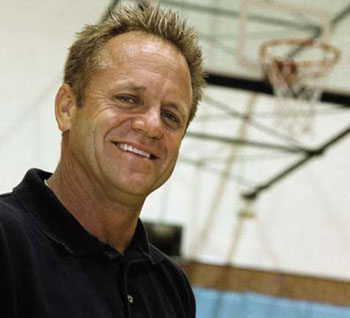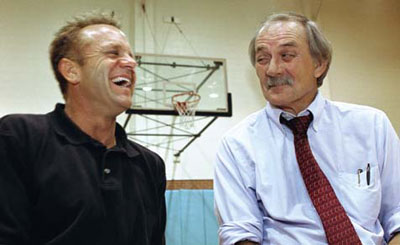| Prof analyzes presidential election | Randy Snow joins Olympic Hall | Distinguished alumni named |
 |
||
| Home Forethought Campus Buzz Feature Stories Re:Search The Score Alum News Yesteryear | ||
The pressure didn�t come for Randy Snow when he shared a stage with Jackie Joyner-Kersee and Bonnie Blair. The best athlete in his field, he�s accustomed to the spotlight. No, the pressure hit him days before his groundbreaking induction into the Olympic Hall of Fame in late June.
 |
�I�m more nervous about having my family, my girlfriend�s family and my friends all together in one place,� he said.
He�s much more comfortable with world-class athletes.
Snow, who earned a bachelor�s in business administration from UTA in 1986 and Paralympic medals in three sports, joined the hall of fame alongside such names as Joyner-Kersee, Blair, Florence Griffith Joyner, Dan Jansen, Matt Biondi and Janet Evans. He is the first-ever Paralympian inductee.
He won a silver medal in the 1,500-meter exhibition race in Los Angeles in 1984; gold medals in singles and doubles tennis in Barcelona, Spain, in 1992; and a bronze in basketball in Atlanta in 1996. But none compare to his most recent honor.
�Getting inducted into the hall of fame is a lot different than winning an Olympic medal. It�s tangible. It�s something you can�t control. You don�t set your sights on a hall of fame, but it kind of completes the circle of an athlete�s career.�
Olympic Hall of Fame members are inducted by public vote. Snow said it wasn�t until friends said, �Hey, I voted for you� that he even knew he was eligible. He beat out four others in the Paralympian category.
�I probably don�t realize how big it is,� he said. �It�s not up to me. I just happened to be at the right place at the right time. But I hope I opened the door for others. � I�m trying to weigh its magnitude. I want to be grateful, but I want to pat myself on the back a little, too.�
Snow, 45, overcame much to get there. An elite junior tennis player by age 16, he thought he was done with sports when, while working on a farm for the summer, a half-ton hay bale crushed him, leaving him paralyzed from the waist down. He calls the accident both the best and worst thing that ever happened to him.
�It derailed my plan for who I was going to be. It was devastating in that I had to rally and focus on new strengths in order to achieve my goals and struggle through an acceptance process.�
But the accident also brought out a new side in Snow, one that showed his determination to never lose. �I thought, if I can handle this, I can handle anything. It just reminded me that there are going to be things that I can�t control.�
 |
| Randy Snow credits Jim Hayes for much of his athletic success, calling the Movin' Mavs coach "the first person who brought the Trojan horse of wheelchair sports into my life." Snow, who won Paralympic medals in track and field, tennis and basketball, is now a motivational speaker and published author. |
Snow finished high school and enrolled at U.T. Austin. Then he met Jim Hayes.
Snow called Hayes, UTA�s noted wheelchair basketball coach, on a Friday afternoon almost 30 years ago, inviting him to Austin for the weekend.
�He said, �We want to start a wheelchair basketball team down here � but we don�t know what we�re doing,� � Hayes recalled recently. �So I went down there to conduct a practice.�
The team Hayes encountered surprised him. A half-dozen players sat in bulky 60-pound wheelchairs�instead of sleek chairs designed for athletics�and they wore jeans and boots. �It was a motley crew. It was ugly,� Hayes remembers. �We did an hour and a half practice, then I turned around and went back to Arlington.�
Soon, Snow followed Hayes up Interstate 35, joining what might have been UTA�s best-ever wheelchair team in 1981. A team that never won a championship.
In the only season no national championship tournament was played (the governing body canceled it for reasons unknown to Hayes), the Movin� Mavs featured Snow as the off-guard with players of equal talent around him. Three of the starting five, including current UTA faculty member Abu Yilla, would later play professionally.
With no college teams offering competition, UTA played semi-pro teams and reached the regional round of their national tournament.
�Three of those guys were going to graduate. It was kind of a one-shot deal,� Hayes said. �Now for a college team to even be there, to be listed in the Top 20 [of the National Wheelchair Basketball Association], that was unheard of.�
Snow would eventually win two national championships, but he was never a part of UTA�s six crowns. He won titles with a Fresno, Calif.-based semi-pro team and with the Dallas team.
Still, he credits his college coach for much of his success. He calls Hayes �the first person who brought the Trojan horse of wheelchair sports into my life.�
�He planted the seed,� Snow said. �He revealed those new opportunities. � I was bringing a lot of comparisons into my life [with] the way it used to be. That created frustration and friction.
When wheelchair sports arrived, it was like a rescue boat came to me. I began to meet all the people who had been rescued as well. I just couldn�t get enough.�
And he just couldn�t lose.
�I played against him. My shorts are still at the mid-court line,� Hayes said. �I ran track with him and against him, I coached players with him and against him. Randy was one notch above. When you felt like he got to where he should be with his extensive talents, he�d take the next step. Unless he beat John McEnroe, he was not going to be happy with his tennis game.�
Hayes said Snow�s induction into the Olympic Hall of Fame does more than honor one man. It validates the notion of wheelchair athletics.
�There are those out there who think you don�t measure up the same as able-bodied sports,� he said. �Randy surpassed all that with his selection. � He was recognized as one of the world�s best all-time athletes, because that�s what he is.
�But the neat thing about Randy is that he�s always taken the opportunity to put something back in the system. He�d rather spend time with the 7-year-old just getting into wheelchair sports than he would with Bonnie Blair.�
Snow, who now lives in Terrell, hasn�t lost his competitive edge. He still keeps fit, exercising two hours a day on a machine resembling a bicycle for the arms. He makes his living as a motivational speaker for audiences ranging from elementary school students to Fortune 500 companies.
�It�s pretty interesting where clients come from,� he said. �We all need a boost. We all need people behind us.�
A published author, Snow speaks on topics ranging from overcoming obstacles to being an effective leader and earns up to $5,000 per appearance. He has plenty of material to draw from, based on athletic achievement alone. Yet he says his biggest accomplishment has nothing to do with sports.
�I still look back on my degree at UTA,� he said. �That was kind of an Olympic campaign in itself.�
— Danny Woodward
| Archives
| Alumni Association |
Giving to UTA | UTA
Home Copyright © 2004 UTA Magazine. All rights reserved. |